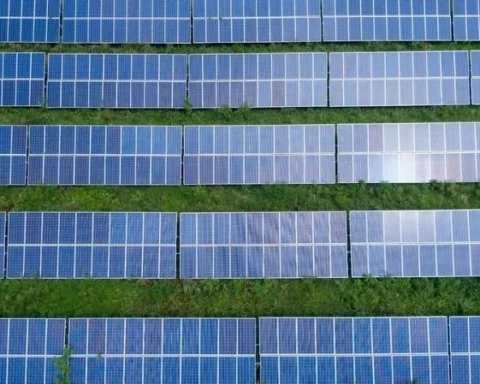Nigeria, the most populous country in Africa, has long been known for its reliance on fossil fuels.
However, in recent years, the country has begun a shift towards renewable energy, with solar power emerging as a popular alternative.
This transition has been hailed by experts as a major win in the fight against climate change.
Nigeria has been grappling with the effects of climate change for decades, with rising temperatures, droughts, and flooding leading to significant economic and social impacts.
The country is also one of the largest emitters of greenhouse gases in Africa, largely due to its reliance on fossil fuels such as oil and gas.
Nigeria for some time has begun to take steps towards a more sustainable future. One of the key drivers of this shift has been the government’s focus on renewable energy, particularly solar power.
In 2015, Nigeria committed to generating 20% of its electricity from renewable sources by 2030, and the government has since launched several initiatives to support this goal.
These initiatives have included the establishment of the Rural Electrification Agency (REA), which is tasked with increasing access to electricity in rural areas through the use of renewable energy, and the launch of the Nigerian Electrification Project (NEP), which aims to provide access to electricity to 5 million people by 2023, with a focus on renewable energy solutions.
The government’s efforts have been complemented by a growing private sector, with local and international companies investing in solar projects across the country.
One such company is, Sterling and Wilson Solar Solutions (SWSS), the US subsidiary of Sterling and Wilson Solar Limited (SWSL), which signed a Memorandum of Understanding (MoU) with the Nigerian government last year, along with its consortium partner Sun Africa, for setting up of solar PV power plants aggregating 961 MWp.
These plants will be set up at five different locations in Nigeria along with battery energy storage systems (BESS) with a total installed capacity of 455 MWh, the company said in a regulatory filing.
These projects will ultimately be owned and operated by Niger Delta Power Holding Company, a Nigerian Government owned entity. Financing for these projects is under negotiations between US EXIM, ING, and the Government of Nigeria, the company said.
“Solar combined with energy storage is going to be the future of power generation in Africa,” said Amit Jain – Global CEO, of Sterling, and Wilson Renewable Energy (SWRE) Group, adding that SWRE has contributed the maximum solar capacity in Africa with a portfolio of over 1 GWp.
The project is expected to provide electricity to over 1.5 million people and has already been hailed as a major milestone in Nigeria’s transition to renewable energy.
Experts have welcomed Nigeria’s shift towards solar power, noting that it has the potential to significantly reduce the country’s greenhouse gas emissions and mitigate the effects of climate change.
“Nigeria is one of the most vulnerable countries to the impacts of climate change, and it is essential that the country takes urgent action to reduce its emissions and build resilience,” says Ajayi Olajire a climate advocate in Ilorin, Kwara State.
According to the International Energy Agency (IEA), solar power has the potential to play a major role in Nigeria’s energy mix, with the country boasting one of the highest solar irradiation levels in the world.
The IEA estimates that Nigeria could generate up to 600 GW of solar power, which is more than twice the country’s current installed capacity.
However, Olajire cautioned that there are still challenges to be overcome in Nigeria’s transition to solar power. These include the high cost of solar equipment, lack of access to financing, and the need for supportive policies and regulations.
“The transition to solar power requires significant investments, both from the government and the private sector.
“There is also a need for policies and regulations that support the development of renewable energy, such as feed-in tariffs and net metering,” he said.
Tinubu’s Fuel Subsidy Stoppage Makes Solar a Viable Alternative
In recent years, Nigeria has been grappling with the issue of fuel subsidy, which has been a major drain on its economy. The subsidy, which was originally intended to cushion the effects of rising fuel costs on the poor, has been beset by corruption and mismanagement.
However, with the recent push by President Tinubu by ending the subsidy, Nigerians are increasingly turning to solar power as a viable alternative.
Solar power has long been touted as a solution to Nigeria’s energy woes, with its abundant sunshine and vast potential for renewable energy.
However, the high cost of solar equipment and lack of government support have hindered its adoption, but with the government’s renewed focus on sustainable energy, the tide is turning.
The decision to end the fuel subsidy has been met with mixed reactions, with some Nigerians expressing concern about the impact on their wallets.
However, many have embraced the move as a necessary step towards a more sustainable future.
Solar power has emerged as a popular alternative to traditional fuel sources, and local businesses have begun to capitalize on the trend.
One such business is FEMTEC Solar, an Ilorin-based company that specializes in solar panel installation and maintenance.
According to its CEO, Engr. Femi Emmanuel, the company has seen a surge in demand in recent months, as Nigerians seek to reduce their reliance on traditional fuel sources.

“We’ve seen a 300% increase in inquiries over the last three weeks of the present administration.
“People are realizing that solar power is a viable alternative that can save them money in the long run.”
Femtech Solar is not alone in its success as other solar companies have reported similar increases in demand.
Reducing fuel costs was a popular but environmentally and economically costly system.
The state petroleum company, NNPCL, says Nigeria spent 4.39 trillion naira ($9.7 billion) on the subsidy last year, leaving the government struggling to finance infrastructure projects, including rail systems that could help reduce emissions from vehicles.
Gas-powered generators also contribute significantly to emissions, having proliferated under the subsidy in a country where only half the population of more than 200 million have access to grid electricity. Those who do often endure blackouts.
Solar adoption, on the other hand, has largely been hampered by relatively high upfront costs, with only 1.25% of Nigerian households installing those systems, according to a 2022 study conducted by Boston Consulting Group and All On.
If 30% of Nigerian households turned to solar by 2030, 5 million metric tons of carbon dioxide would be avoided, reducing emissions from households by 30%, the study added.
As Nigerians seek to take advantage of the government’s renewed focus on sustainable energy.
This bodes well for the future of solar power in Nigeria, which has the potential to become a major player in the global renewable energy market.
President Tinubu’s decision to end the fuel subsidy may have been controversial, but it has also sparked a renewed interest in sustainable energy.
Nigerians are increasingly turning to solar power as a viable alternative to traditional fuel sources, and local businesses are capitalizing on the trend.
There is growing optimism that Nigeria’s transition to solar power will continue to gain momentum. The government’s commitment to renewable energy, coupled with the increasing cost competitiveness of solar, is expected to drive further investment in the sector.
In addition, the benefits of solar power extend beyond reducing greenhouse gas emissions. Solar projects have the potential to create jobs, increase access to electricity, and improve energy.
As the country continues to transition towards a more sustainable future, solar power is poised to play a prominent role in Nigeria’s energy mix.
By Dare Akogun







